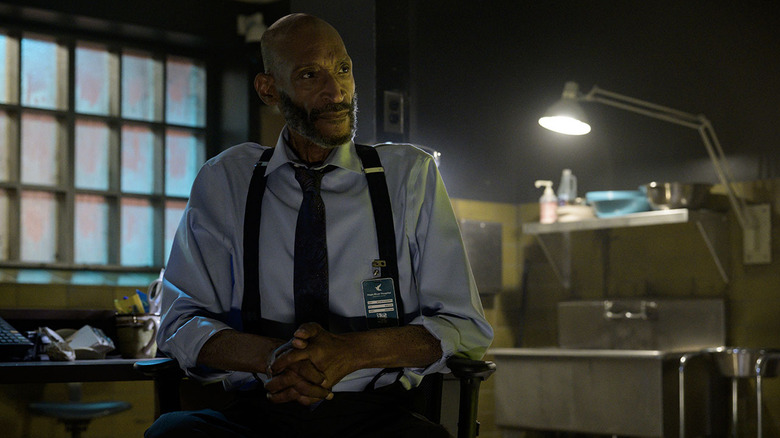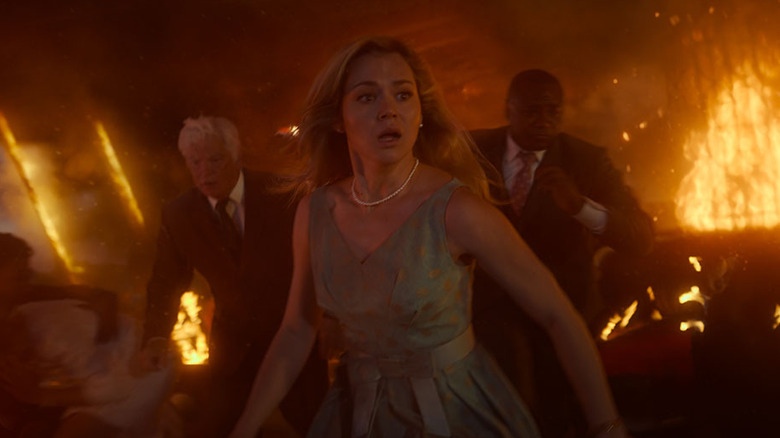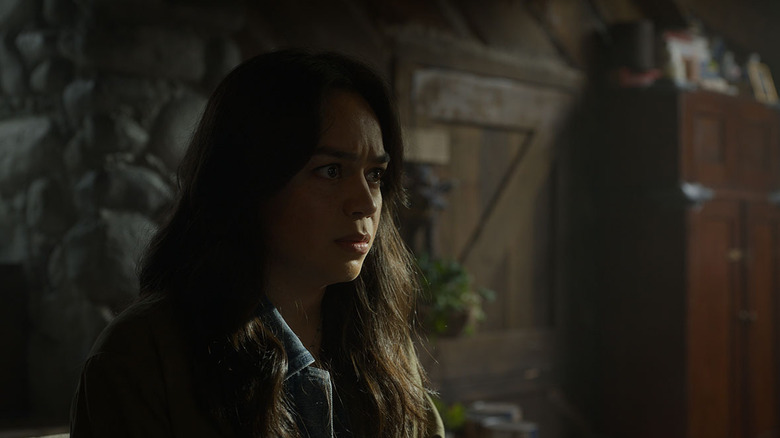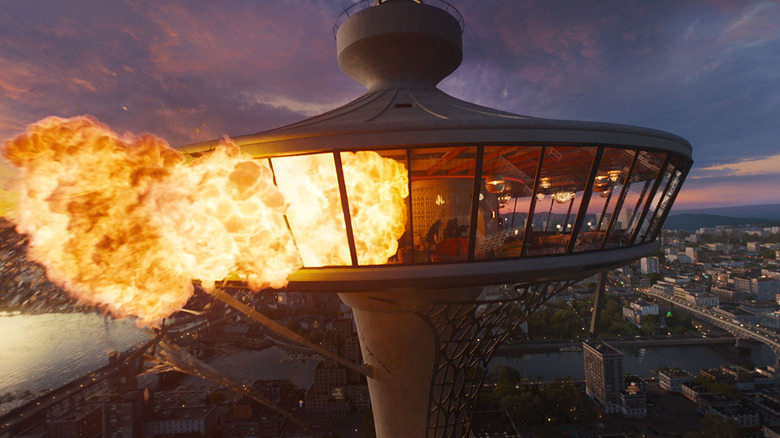5 Reasons Why Final Destination Bloodlines Killed It At The Box Office
Horror has arrived at the summer box office in a big, bad way. Marvel's "Thunderbolts*" kicked off the summer a few weeks ago and has done so-so business (by Marvel standards). So, we've been waiting for a major breakout hit. We now have it in the form of "Final Destination Bloodlines." As the first entry in the "Final Destination" franchise in 14 years, it met what was very obviously a pent-up demand on the part of the moviegoing public. As a result, the film over delivered against projections.
Directors Adam Stein and Zach Lipovsky's "Bloodlines" opened to an estimated $51 million domestically to go with another $51 million overseas for a $102 million global opening. That gives it the biggest debut for a horror movie in 2025 thus far, topping Ryan Coogler's "Sinners," which opened to $48 million in April. It's also by far the biggest opening for any movie in this franchise, topping 2009's "The Final Destination," which bowed to $27.4 million on its way to a $187.3 million global total.
"The Final Destination" remains the highest-grossing entry in the film series overall to date, though "Bloodlines" will easily surpass it in the coming weeks. Against a $50 million production budget, it's pretty safe to say that Warner Bros. and New Line have a huge hit on their hands. Ahead of the weekend, "Bloodlines" was expected to pull in at most $35 million. This has become the latest example of a movie blowing past pre-release tracking, which is good news for just about everyone.
So, what went right here? Now did Warner Bros. so successfully revive a long-dead franchise in the midst of a crowded summer season? We're going to look at the biggest reasons why "Final Destination Bloodlines" absolutely killed it at the box office. Let's dive in.
Generational nostalgia for Final Destination was massive
Dating back to the original installment in 2000, there were five "Final Destination" movies released up through 2009. Those movies collectively made more than $650 million at the worldwide box office, making it one of the most successful horror franchises of the 2000s alongside the likes of "Saw." Eventually, though, the property went away after "Final Destination 5" hit theaters. That, oddly enough, was a big key to the success of "Bloodlines."
Over the last 14 years, the generation of fans that grew up with these films have become hungry for another installment. They also have a lot of nostalgia for the whole "Death as a slasher movie villain" concept. Meanwhile, a new generation discovered these films and had never had the chance to see one on the big screen. It's not unlike what happened with "Jurassic World," which became a $1.6 billion smash hit in 2015. A 14-year gap between installments led to multi-generational-nostalgia and feverish demand.
I'm not saying "Bloodlines" is going to make $1.6 billion, but I am saying allowing the demand to build for this property's return, as opposed to wringing blood from the stone over the last decade and change, made this movie a bigger success. The franchise is now set up to possibly enjoy another multi-movie run, not unlike the recent "Scream" films.
Reviews for Final Destination Bloodlines were glowing
Horror is one of the few genres out there that can endure rough reviews and still find commercial success. That said, when critics and audiences alike are on a horror movie's side, it can mean big things. We saw that with "Sinners" recently and we're seeing it again here. "Final Destination Bloodlines" currently has a 93% critical approval rating on Rotten Tomatoes to go with an 89% audience score. Those are both high marks for the long-running franchise. It also has a very solid B+ CinemaScore, which is great for a horror film.
/Film's BJ Colangelo labeled the "Final Destination" sequel as the "bloody best one yet" in her review of "Bloodlines." So, it's not just that we had pent-up demand for a new "Final Destination" movie, it's that the film we got delivered in a big, crowd-pleasing way. It's one thing to make people wait. It's another thing entirely to make them wait for something better than they dared hope for. Stein and Lipovsky managed to make a very effective entry in this property — one that currently stands a very good chance at becoming the biggest R-rated horror movie of the year when all's said and done.
Final Destination Bloodlines was marketed perfectly
I'm no marketing expert, but what I can say with confidence is that Warner Bros. executed a pitch-perfect campaign for this movie. The premise for "Final Destination" has always been simple: Death will come for its victims even if they manage to elude them. Death also makes itself known by killing people in outlandish ways, and seeing these elaborate deaths play out has always been what makes these movies worth the price of admission.
That's why the trailers for "Final Destination Bloodlines" were so damn effective. They teased the epic and outlandish death scenes without giving too much away. From the movie's big, ridiculous opening to some of the other more twisted set pieces, audiences knew what they were getting into if they bought a ticket to see this movie. WB teased enough without spoiling too much and essentially said, "We know what you want to see and we promise we're going to give it to you." That may sound simple enough on paper, but long-awaited franchise revivals can easily risk disappointing moviegoers who have been eagerly anticipating the return of something they love. The "Bloodlines" marketing made big promises and delivered the goods. It's as simple as that.
The Jon Watts factor
This one may be a bit of a stretch, but in my mind, it shouldn't be discounted. Jon Watts, the director behind Tom Holland's "Spider-Man" trilogy, is a producer on "Final Destination Bloodlines" and also helped cook up the story. Mind you, this is the very same Watts who directed "Spider-Man: No Way Home" to more than $1.9 billion at the box office, grossing more than both "Spider-Man: Far From Home" and "Homecoming" (which, to be clear, were very successful movies in their own right).
Watts seems to have a golden touch when it comes to long-gestating franchises, and his involvement in bringing "Final Destination" back to life shouldn't be dismissed. When the "Final Destination" sequel was first announced in 2022, it was Watts' name that was right up front. There's a good reason for that. He clearly had a take on the material and, though he wasn't in the director's chair and Guy Busick and Lori Evans Taylor ended up being credited with the script, Watts helped get the gears in motion. At least a little bit of his magic rubbed off here, it seems. Granted, everyone else involved deserves a lot of credit as well, but it seems that Watts' clout and concept is what got this movie going at Warner Bros. a few years ago. That can't be dismissed.
Bloodlines went for the biggest screens possible (not HBO Max)
The most important factor above all else when it comes to this movie's success at the box office is that it had a chance at the box office at all. Let us not forget that Warner Bros. originally intended for this film to go directly to HBO Max. Instead, the studio is now staring down the barrel of a massive theatrical hit that will then become a big VOD success and, eventually, a popular streaming title on HBO Max (almost certainly bigger than it would have been as a direct-to-streaming release).
It's a lesson that Hollywood should have learned firmly by now, but it bears repeating: Big, direct-to-streaming movies just don't make much sense anymore. Disney's "Moana 2" should have been the final nail in the coffin for that argument when it made more than $1 billion last year after being shifted from streaming to theatrical. "Bloodlines" now serves as further evidence that studios shouldn't be putting movies like these directly on their streaming services pretty much ever. It makes no sense for anyone involved. In this case, Warner Bros. would have left a fortune on the table had it gone with the original release strategy.
"Final Destination Bloodlines" is in theaters now.





